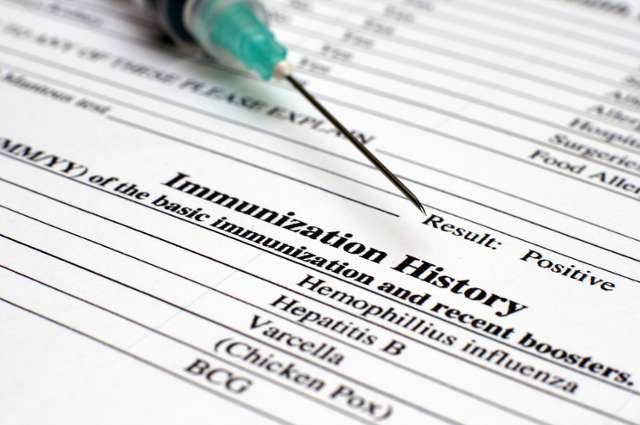Lack of immunity poses greater threats as children grow older, according to study

Before vaccines, a kid didn't have to wait very long before catching diseases like the measles. Now that most people are protected against those former childhood killers, an unvaccinated person could go years or even decades before being exposed to certain viral pathogens for the first time. Parents who refuse vaccines for their children for whatever reason are playing those odds. But there's a danger in that, according to a new mathematical model by Tufts epidemiologist Elena Naumova and her colleague Nina Fefferman, G05, a computational biologist at Rutgers University. Their work was published online in the May edition of The Lancet Infectious Diseases.
Noting that public debate has focused on the potential risks of vaccines, Naumova, professor at the Friedman School, and Fefferman, who received her Ph.D. in biology from Tufts, attempted to quantify the risks of severe outcomes from certain infectious diseases that vaccinations can prevent.
By evaluating existing data about outbreaks of measles, chicken pox and rubella in the United States, the pair calculated the risks of dying from these illnesses both before and after widespread vaccination. The researchers show, for example, that a child typically would have contracted measles at about age 5 in the pre-vaccination era, compared with about 19 years old now, when the illness would likely be more severe. With that age increase comes a major increase of risk.
Tufts Now: What's the takeaway message that comes out of this calculation?
Elena Naumova: The premise here is that if you get infected with a viral disease at different stages of life, you might have a different outcome. Often the analysis of risks compares the risks of adverse reaction to vaccine with the probability of contracting the disease. But the evidence from the scientific literature basically speaks to the idea that for some viral infections—like rubella, chickenpox and measles—the severity of adverse health outcomes increases with age, so the older you are, the worse the outcome might be for these preventable diseases.
In the pre-vaccination era, everyone was exposed to common viruses, and you could get this exposure at any stage in your life. If we have a well-vaccinated population, it means the chances of being exposed are much smaller than before. However, as widespread vaccination makes preventable infections less common, infected children are at increasing risk for severe outcomes due to the decline of protective immunity in the population, known as "herd immunity."
What are some examples?
Take the example of the viral pathogen rubella. For a girl, it wouldn't be a problem to have rubella—generally a mild infection—at a very young age. But if a pregnant woman comes down with rubella, the effect would be very severe—it can cause severe birth defects, known as congenital rubella syndrome. So the risk starts to change in age transition from childhood to adolescence and adulthood.
The risk of dying from another viral infection, measles, is high for infants. As children get a little older, the risk decreases. But it starts to go back up again with age. At ages 12 to 14, the risk of dying from measles is almost equal to that of children under age 1. We demonstrated that with a reduction in vaccination coverage, the risks of severe outcomes increase dramatically: almost 5.8 times for rubella and 4.5 times for measles.
Do you think this work will change any minds?
I doubt this paper will be able to move those who are already polarized or who are highly opinionated about this topic. I hope this paper might best serve physicians and public health professionals by giving them additional ammunition with which to convince people who are maybe on the fence that vaccination really is the right practice.
Does it really matter if individuals opt not to get vaccinated?
The severity of your illness at any age might depend on many factors. We know, for example, if a person with pre-existing health conditions is exposed to influenza, we might expect that person will respond to that illness more severely than others. We also expect that a flu shot will help to reduce the chance of illness. Or, if influenza develops, it would be in a mild form.
The individual decisions to get a flu vaccine every season have effects on entire populations. Steve Cohen [an adjunct assistant professor at Tufts School of Medicine] and I published a paper in 2011 about the long-term consequences for the elderly of vaccinating young children. When we vaccinate children, we are not only helping a child who doesn't yet have the immunity to prevent disease, we are also helping people who have lost their ability to fight disease. To me, that's an extremely powerful concept.
We live in communities, not in vacuums, and when we share spaces we share microbial pathogens. We should probably stop thinking of ourselves as being at war with the microbes. Instead, we should think of the relationship as symbiotic—but we still have to create the conditions where every person and each community tries to reduce the risks of exposure to pathogens and the risks of preventable infections on all fronts.
More information: "Dangers of vaccine refusal near the herd immunity threshold: a modelling study." DOI: dx.doi.org/10.1016/S1473-3099(15)00053-5















